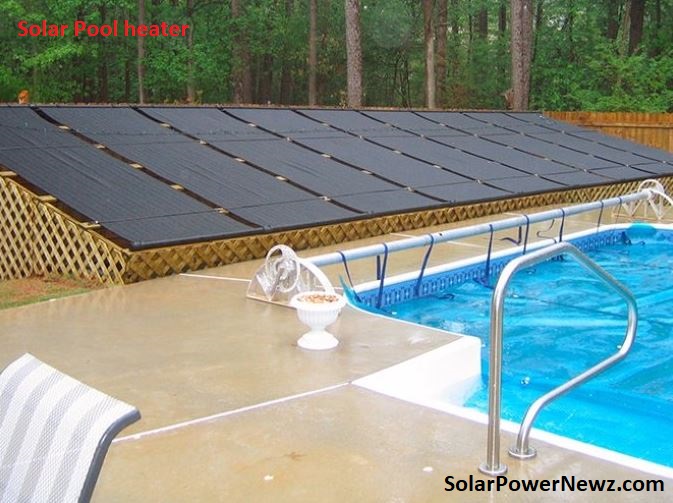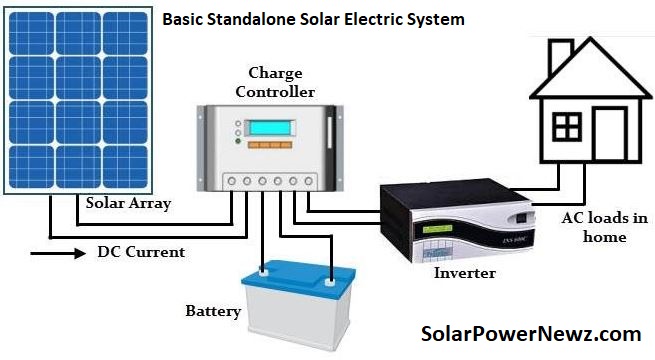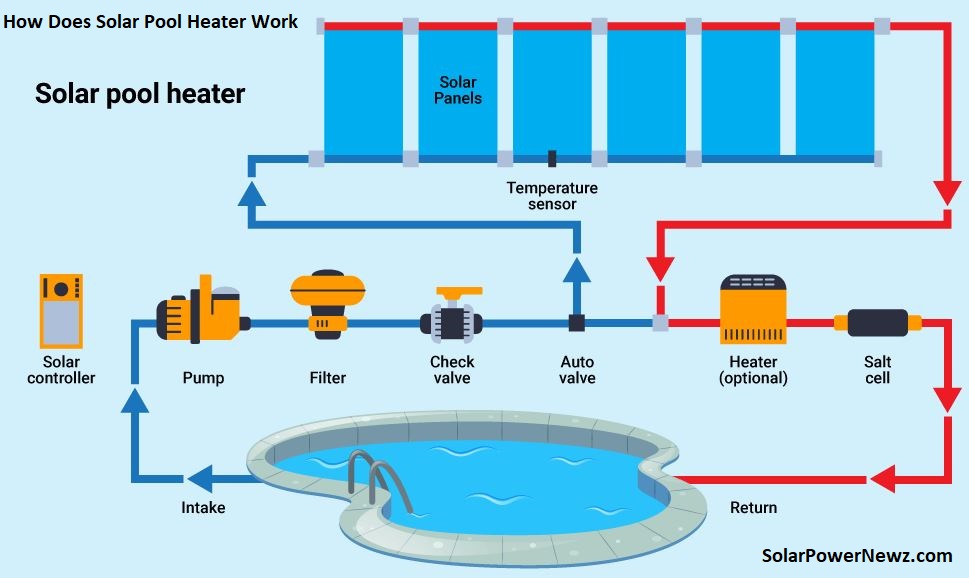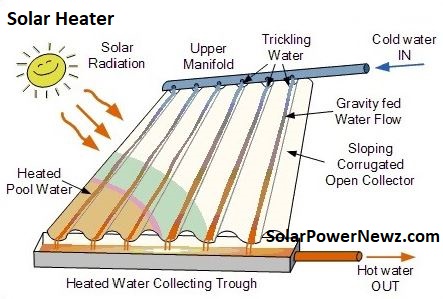What Is A Solar Pool Heater?

In this article we will discuss about What Is A Solar Pool Heater, Installation, Cost & Working. Pumping pool water through a series of tubes known as a Solar Collector or Solar Absorber installed on the ground or roof of a building constitutes a Solar Pool Heating system. The sun’s free energy heats the circulating water, which returns to the pool at a higher temperature.
Table of Contents

Solar pool heating systems are entirely automatic and work in tandem with your pool equipment. On the sun control, you adjust the desired water temperature. When there is solar energy available on the solar collectors.
An automated motorised valve sends water through the solar panels, returning solar heat to the pool. This process is repeated until the pool’s filtration pump is turned off for the day or the target pool temperature is reached.
Most of the time, the existing filter pump can easily give enough flow to the solar panels. The sole condition is that the filter pump run during the day (10:00 am to 5:00 pm).
Whether you have solar or not, most pool professionals recommend running your filter at this time. It is also the time when the pool is most likely to be utilised and the time when strong circulation is essential for sanitising chemical dispersion.
How Does Solar Pool Heater Work?

The majority of solar pool heating systems incorporate the following features:
- A solar collector is a device that circulates pool water to be heated by the sun. A solar panel illustration. A tube is at each end of the panel, and arrows illustrate the flow travelling through one tube, across the panel, and out the end of the other tube, which is designated the header/manifold.
- A filter — eliminates particles before water is pushed through the collector
- A pump circulates water through the filter and collector before returning it to the pool.
- A flow control valve is a mechanical or electronic device that directs pool water through the solar collector.
Pool water is run through the filter and then through the solar collector(s) before being returned to the pool. In hot climates, the panels can also be utilised to chill the pool at night by circulating the water through the panels.

When the collection temperature is sufficiently higher than the pool temperature, some systems include sensors and an automatic or manual valve that directs water through the collector(s). When the collector temperature is close to that of the pool, the filtered water simply bypasses the collector(s) and returns to the pool.
Solar pool collectors for swimming pools come in a variety of materials. The type you require is determined by your environment and how you want to utilise the collector. If you only use your pool while the weather is above freezing, an unglazed collector system is generally all you need. Unglazed collectors lack a glass cover (glazing).
They are often composed of tough rubber or plastic that has been treated with a UV light inhibitor to help the panels endure longer. Because of their inexpensive parts and basic design, unglazed collectors are typically less expensive than glazed collectors.
If the system is built to drain back into the pool when not in use, these unglazed systems can even be employed for indoor pools in cold areas. Even if you need to shut down the system in cold weather, unglazed collectors can be more cost-effective than installing a more expensive glazed collector system.
An illustration of how a solar collector works.
Glazed collector systems often comprise of copper tubing on an aluminium panel with an iron-tempered glass cover, increasing their cost. Glazed collector systems with heat exchangers and transfer fluids catch solar heat more efficiently than unglazed systems in cooler weather.
Therefore, they can be utilised all year round in various climates. Glazed collectors can also be used to heat water all year.
When used in cooler temperatures, all glazed and unglazed collector systems must feature freeze protection.
How Much Does It Cost To Install A Solar Swimming Pool Heater?
A solar pool heating system is typically priced between $2,500 and $4,000 to purchase and instal. This has a payback period of 1 to 7 years, depending on your local fuel costs and solar resource availability. They also have a longer lifespan than gas and heat pump pool heaters. Many factors influence your actual cost and payback.
- Most people spend $5,000 for a glazed solar panel pool heater for a 12-foot by 24-foot in-ground pool, with the national average cost of installing a solar pool heater hovering between $3,000 and $7,000.
- For a 10-foot by 20-foot in-ground pool placed on a platform nearby, unglazed solar panels at the low end of the range can cost up to $2,000.
- A large 18-foot by 36-foot pool may cost $10,000 or more if a high-temperature home-mounted collector is used.
Solar Pool Heater Installation Cost
| National average cost | $5,000 |
| Average range | $3,000-$7,000 |
| Minimum cost | $2,000 |
| Maximum cost | $10,000 |
Solar Pool Heater Costs By Type
A solar pool heater ranges in price from $500 to $11,000, depending on the model. All solar pool heaters work similarly but are composed of different materials and come in varying sizes. Solar pool heaters are classified into four types. Some varieties function better than others in certain pools based on the type of pool and substance.
| Type | Average Cost (Installed) |
| Propylene Mats | $500 – $3,000 |
| Unglazed Solar Panels | $1,500 – $4,000 |
| Glazed Solar Panels | $3,000 – $8,500 |
| High-Temperature Collectors | $9,000 – $11,000 |
1. Propylene Mats
The most cost-effective solution is propylene matting. The mats cost between $500 to $3,000 for a small pool and $3,000 for a larger pool. It is sometimes referred to as unglazed solar heating because it is made consisting of a cloth mat with coils running through it.
In warm, sunny areas such as California or Florida, the mat is a good choice. However, it is less effective at heating pools in temperate climes.
2. Unglazed Solar Panels
Unglazed solar panels are less complicated and less expensive than glazed solar modules. These panels are comprised of plastic or heavy-duty rubber that has been treated with UV light inhibitors to extend their life. They simply lack the same glazing and exterior glass cladding.
In the summer months, unglazed solar panels act similarly to glazed solar panels, however the glass cover allows glazed solar panels to perform better in the cold months. These panels will cost between $ 1,500 and $ 4,000.
3. Glazed Solar Pool Heater
Glazed solar panels cost between $3,000 for a modest system and $8,500 for a large system. When most people think of solar panels, they see a glazed system comprised of glass. This technique is better suited for places that require more heat or do not have enough long, sunny days to create enough solar heat.
Glazed solar pool heaters are constructed with copper pipes connected to an aluminium plate and covered with iron-hardened glass. In cold weather zones, the design is more efficient than unglazed systems at capturing solar heat. A solar pool warmer with glass panels can be used all year.
4. High-Temperature Solar Collectors
Solar collectors range in price from $9,000 to $11,000, depending on size and type. Even if you live in a location with little sunlight, you can utilise solar pool heating. However, you will most certainly require a high-temperature collector, which employs mirrors to maximise the quantity of sunlight that heats the water.
These collectors are intended to considerably raise the temperature of the water. This is especially useful in colder climates or areas with limited sunlight.
Solar Pool Heater Cost By Pump Size
Prices for solar pool heater pumps range from $50 to $1,300, depending on size and type. To efficiently circulate the heated water with the cooler water, some solar pool heaters require a pump. This pump may be operated with solar panels or with electricity.
| Pump Size | Gallons per Minute | Pump Cost (Materials Only) |
| 0.5 HP | 40 | $50 – $400 |
| 1 HP | 60 | $150 – $600 |
| 1.5 HP | 68 | $200 – $700 |
| 2 HP | 76 | $500 – $750 |
| 2.5 HP | 80 | $600 – $800 |
| 3 HP | 85 | $700 – $1,300 |
The Cons Of Solar Pool Heaters
A solar pool heater may be the wrong solution for your house for reasons other than cost…
- Time Intensive. It can take a long time for solar pool heaters to heat up your pool. The exact time depends on the size of the pool and the outside temperature. If you want to heat up quickly, these heaters are probably not for you. Even in direct sunlight, solar pool heaters can take an entire day to warm your pool by 5-7 degrees.
- Sunlight is required. The hitch with solar pool heaters is that they need bright sunny days to work. But the temperature on these days is high enough that you may not require a heated pool. The term “electronic commerce” refers to the sale of electronic goods. Solar pool heaters, on the other hand, cannot transfer thermal energy to your pool water without consistent sunlight.
- Solar-powered pump. Without a solar pump, your swimming pool’s water cannot be heated for nothing. Water must be pumped to the solar panels with the help of electricity. This can increase your energy bills. But as we noted before, the rise in utilities is low, especially when compared to other pool heating options.
Solar Pool Heater Advantages
Solar pool heaters provide numerous advantages that far outweigh the downsides. Here are a few of the most obvious examples:
- Simple to maintain. Just a few parts make up a solar pool heating system. As a result, over a long period of time, little to no maintenance is required.
- Heat that is sufficient. If you live in a place with abundant sunlight, solar pool heaters can quickly raise the temperature of your pool. You may take a warm bath whenever you want if you combine the heating with a solar pool cover.
- Use switches that operate automatically. You can get an automatic diverter valve that will monitor the temperature of the pool and direct water to the solar panels for a tiny additional cost. This suggests that the system can be set up to maintain your pool at a set temperature.
FAQs.
What Is A Solar Pool Heater?
Pumping pool water through a series of tubes known as a Solar Collector or Solar Absorber installed on the ground or roof of a building constitutes a Solar Pool Heating system. The sun’s free energy heats the circulating water, which returns to the pool at a higher temperature.
How Does Solar Pool Heater Work?
Solar pool heaters operate by capturing a portion of the sunlight and using it to circulate water from your pool through your filter and back. Along the route, the water is warmed by passing through a series of solar collectors.
How Much Does A Solar Pool Heater Cost?
The average solar heating system costs between $2000 and $4000, depending on the sort of panels you choose to instal. Continue reading to have a better understanding of the aspects that influence your costs.
Is Solar Pool Heating Worth It?
Installing a solar pool heater can drastically cut swimming pool heating expenditures. They are cost-effective in comparison to both gas and heat pump pool heaters, and they have relatively low annual operating expenses. In fact, in some areas, solar pool heating is one of the most cost-effective uses of solar energy.
How Much Will A Solar Heater Heat A Pool?
Currently, a pool may be easily heated to 78–85 degrees Fahrenheit using a solar system without glazing. Given that solar pool heating panels have a 20-year lifespan, you may potentially save money for 17 years in this case.
Why Can’t You Heat A Pool With Solar?
Solar radiation is converted into power by solar electric panels. It is extremely inefficient to heat water with electricity. In truth, it takes a lot of electricity and an inefficient conversion process to heat or cool anything (water, air).
How Long Does It Take For A Solar Heater To Heat A Pool?
If you were using an electric pool heat pump, it would take two days and five to six hours of operation to attain a temperature of ten degrees. If you use solar heating, the water temperature in the pool typically rises by 2-4 degrees per day, reaching a 10-degree increase in 5–6 days and then remaining there.